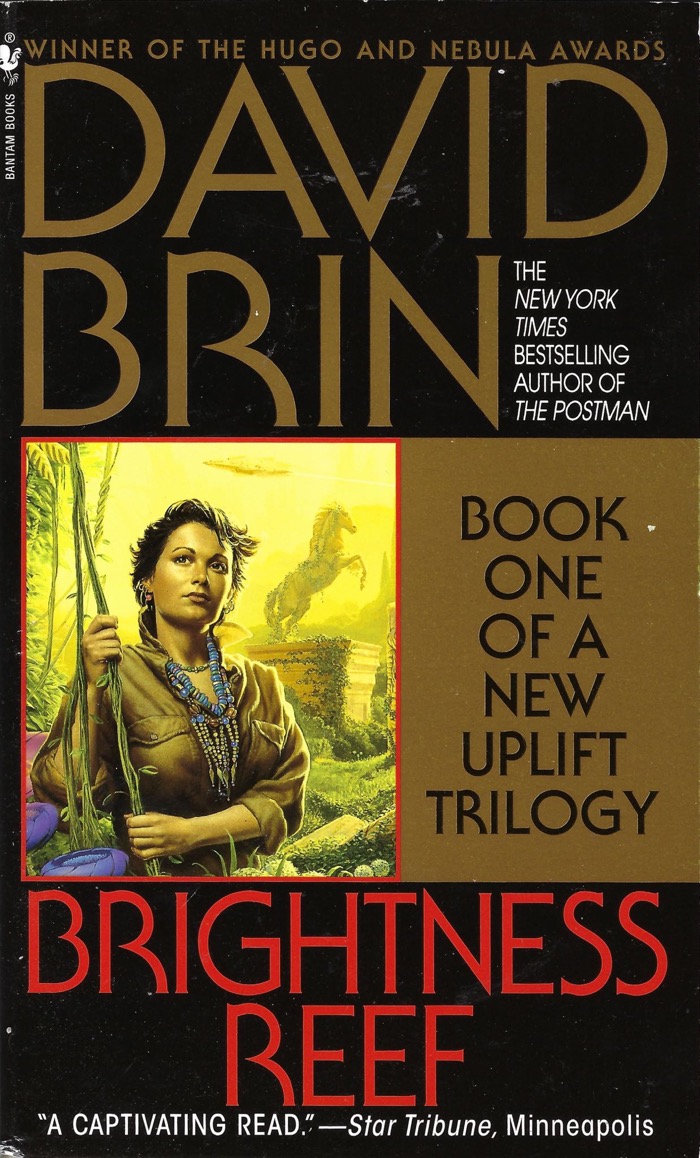Brightness Reef
Series: Uplift 4
Reviewed date: 2004 Dec 10
Rating: 2
659 pages
The cover of Brightness Reef says it is "Book one of a new Uplift Trilogy." That is a lie.
Brightness Reef is the first part of a 1200-page novel which has conveniently been chopped into three pieces and sold to an unsuspecting public as a trilogy. I want my money back. When I buy a novel I expect some semblence of a complete story, not a jumbled mess with a cliff-hanger ending that raises questions instead of wrapping up the plot. This is an affront to readers the likes of which has not been seen since L. Ron Hubbard chopped his 4500-page novel Mission: Earth into ten parts and tried to pawn it off as a Dekology.
The setting is the planet Jijo, where primitive exiled groups of six intelligent races live in secrecy. Jijo is an off-limits planet, and their presence on Jijo is a crime. When one day a starship arrives on Jijo, the six races know they have been discovered. But their discoverers turn out to be criminals--criminals who seem quite willing to kill the Jijoans in order to wipe out any witnesses to their crimes.
David Brin writes in epic fashion, showing how the coming of the starship spurs changes in every facet of Jijoan life. And this is where the story goes wrong. Brin determinedly shows us the big picture of the sweeping changes on Jijo. Rather than pick one character and show how he adapts to the changes, Brin has six main characters. He jumps from viewpoint to viewpoint, character to character, seemingly without a care for how this disjointed jumble annoys and confuses the reader. None of the six characters ever has much to do with any of the others--usually they are dozens or hundreds of miles apart, participating in entirely different events--and the result is that Brin fails to develop any character well enough.
About 400 pages into the book I realized I did not care about any of the main characters. It didn't matter to me whether they lived or died. Only one character--Alvin--was even slightly interesting. This is likely because Alvin's pieces are the only ones written in first person, but also because Alvin is a kid who gets to design and build his own primitive submarine. (And face it, I think we all remember a time when we wanted nothing more than to design and build our own personal submarine.)
Brightness Reef has some positive points. Brin is his usual brilliant self in designing the various alien races on Jijo. There are the wheeled g'Kek, the centaur-like Urs, the scaled and vaguely humanoid Hoon, the Qheuens, the Traeki, and Humans; then there are the sub-sapient races: noors, glavers, and chimpanzees. Designing alien life forms and their cultures is Brin's specialty, and his work is captivating.
But, interesting as they are, Brin's alien races are not enough to make up for the story's poor structure and lack of strong characters. The plot plods along and ultimately Brin reveals nothing of consequence, choosing instead to end the book and make us buy the next installment. But after the shameful way I've been treated already by Brightness Reef, I'll be in no hurry to read the sequels.
David Brin's Uplift series spans six books.
- Sundiver
- Startide Rising
- The Uplift War
- Brightness Reef
- Infinity's Shore
- Heaven's Reach
The first three are stand-alone novels and can be read in any order (although I suggest you read them in the order given.) The last three are a single story and must be read in order; additionally, you must have knowledge of background material from the first three novels in order to fully understand the others.
